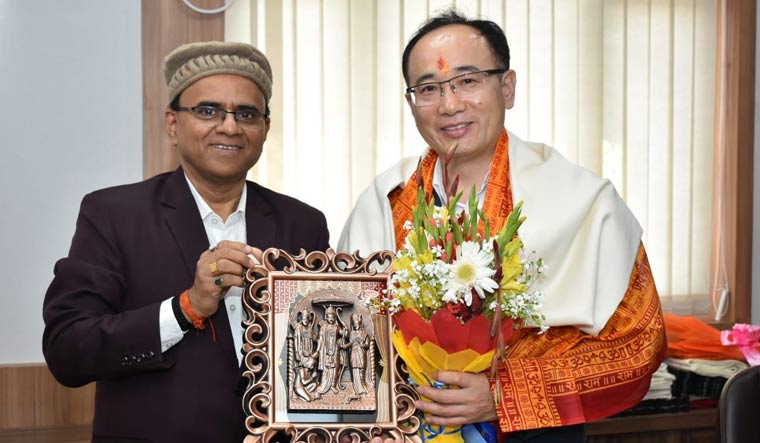A South Korean delegation visited the Dr Ram Manohar Lohia Avadh University of Faizabad today as the first step to the setting up of a Korean Culture Study Centre.
Speaking on the occasion, Kum-pyoung Kim, the director/counsellor of the Korean Cultural Centre India, Republic of Korea, said, “India and Korea have very old relations. A cultural centre will allow for a combined study of Indian and Korean culture.” Elaborating on why Faizabad, the counsellor said that Ayodhya was of special significance to Korea. “We want cooperation in the fields of language, culture, sports and numerous social issues” he said.
The Korea-Ayodhya connect goes back 2,000 years when Princess Suriratna of Ayodhya went there to marry King Suro of Geumgwan Gaya. As per legend, two thirds of Koreans trace their ancestry to this couple. The Queen is regarded highly, as during her lifetime the country saw peace, prosperity and progress.
Chairing a meeting with the delegation that included Embassy’s head of education and the head of administration of the Korean Cultural Centre, the university’s Vice Chancellor, Manoj Dixit, said, “Ayodhya is a cultural heritage with unlimited tourism potential. There is need to strengthen the old ties between Korea and Ayodhya. A study centre will allow for the easy exchange and propagation of culture of both places”.
Dixit also spoke of the University’s plans for the cultural museum to showcase Ayodhya’s rich history and culture. “This will draw even more tourists to Ayodhya and create employment,” he said.
As per the Study of Tourism in the overseas market of South Korea submitted to the Ministry of Tourism, “though the share of Foreign Tourist Arrivals (FTAs) from South Korea to India is moderate (1,06,870 FTAs from South Korea to India in 2014) owing to the religious relationship of Buddhism between the two countries, a vast opportunity lies untapped in the form of outbound travellers in the South Korea market”.
The same report notes that “the maximum traction for India among these travellers from South Korea exists because of the holidays and leisure activities that can be done here. 56% of total 900 respondents indicated this. Other important reasons for travelling to India are pilgrimage/religious activity (18% of the total 900 respondents). 12% responses were received in favour of shopping purposes”.



